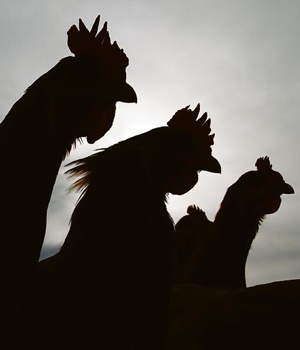
Importing chicken is destroying the local poultry industry and is potentially putting 130 000 jobs at risk.
This is the view of the South African Poultry Association, members of which voiced their concerns at the 110th Avi Conference in Kempton Park yesterday.
With poultry imports currently at their highest level in South Africa’s history, the flood of cheap foreign chicken now accounts for 9.6% of the Southern African Customs Union’s trade deficit, weakening the rand and decimating the local poultry industry, especially small and emerging farmers, the association said.
“The fact is that there is no need to import poultry at all. Poultry does not have to be a part of the trade deficit," said Kevin Lovell, chief executive of the South African Poultry Association.
In 2015, poultry imports amounted to a massive R4.6 billion in an industry that was among the most unprotected in the world, with applied tariff protection equating to barely a few percent a year, Lovell added.
US chicken
The South African agricultural sector and local companies were under a significant threat in March when United States chicken imports hit South African supermarket shelves for the first time in 15 years.
Not only did the chicken imports end a protracted trade dispute and ensured that South Africa would continue to receive trade benefits under the African Growth and Opportunity Act (Agoa), but these chickens were bigger than what the locals produce.
“Over the last five years, the local poultry industry has grown by just 1.7% but imports have grown by 140% once population growth is discounted,” said Lovell.
“South Africans are eating more chicken, but most of this growth in consumption comes from imports.”
Lovell pointed out that all other adjacent industries are under threat too – the poultry industry uses 90% of soya grown locally and is second only to the consumer as the biggest user of maize.
“More than 130 000 jobs depend on this industry. These progressively go by the wayside as imports grow. It is in the national interest to grow the industry because imports don’t use any of these grains, and take jobs rather than create them, with about 1000 jobs lost for every 10 000 tonnes imported.”
Tariffs
Lovell explained that the poultry association’s intention of reintroducing the standard Most Favoured Nation tariff of 37% on poultry from the European Union was to make them pay what everyone pays. Canada applies a tariff of 160%, while the EU’s is the equivalent of about 140%.
“The average tariff on imports last year averaged a bit more than 5%, while in 2013, this was as low as 2.5%. This low level of tariff protection is simply because the EU is excluded, and all we ask is that the EU is treated the same way as all other countries. South Africa is currently the EU’s biggest dumping ground for their waste, and imports keep going up as none of our applications have limited trade,” he says.
“The import community is protecting its turf. Importers are not small; collectively they are bigger than our biggest producer. South Africa is one of the top 10 importers of chicken in the world as our sophisticated banking, logistics, distribution and retail sectors make it easy for foreigners to trade with us as it is relatively risk-free.”
Bones vs breast
European and American consumers prefer breast meat, so their by-products become South Africa’s imports.
“This hurts local producers the most as South Africans prefer chicken on the bone, so that part of the chicken should be what we sell most effectively to our consumers and at a profit,” said Marthinus Stander, chairperson of the poultry association’s broiler organisation.
“Even as these foreign producers export incredible volumes of bone-in imports, they also protect their industries in the US and the EU using phytosanitary measures to restrict our access to those markets, so we cannot sell our breast meat there while they are free to dump here. We say send your whole birds here and let’s compete fairly.”
If South Africa had not agreed to US poultry import terms President Barack Obama might have suspended South Africa’s benefits from the policy, which provides duty-free market access to the US for qualifying South African products.
US ambassador to South Africa Patrick Gaspard said the Agoa agreement would play a huge role in the transformation of the South African economy because the embassy was working with various partners to develop new, black-owned businesses in trade.
David Wolpert, the chief executive of the Association of Meat Importers and Exporters of South Africa, said at the time: “The agreement that is being finalised means the increase in poultry prices will not be as high as was expected because there is now more competition.
“We are thrilled we no longer have to worry about losing the benefits that come with duty-free exports.”




 Publications
Publications
 Partners
Partners








